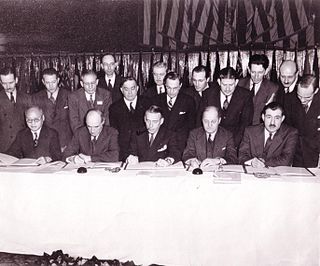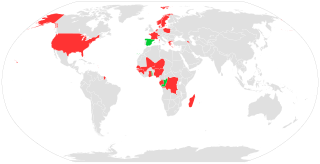Related Research Articles
The Convention for the Unification of certain rules relating to international carriage by air, commonly known as the Warsaw Convention, is an international convention which regulates liability for international carriage of persons, luggage, or goods performed by aircraft for reward.
The Montreal Convention is a multilateral treaty adopted by a diplomatic meeting of ICAO member states in 1999. It amended important provisions of the Warsaw Convention's regime concerning compensation for the victims of air disasters. The Convention attempts to re-establish uniformity and predictability of rules relating to the international carriage of passengers, baggage and cargo. Whilst maintaining the core provisions which have served the international air transport community for several decades, the new treaty achieves modernization in a number of key areas. It protects passengers by introducing a two-tier liability system that eliminates the previous requirement of proving willful neglect by the air carrier to obtain more than US$75,000 in damages, which should eliminate or reduce protracted litigation.

The Convention on International Civil Aviation, also known as the Chicago Convention, established the International Civil Aviation Organization (ICAO), a specialized agency of the UN charged with coordinating international air travel. The Convention establishes rules of airspace, aircraft registration and safety, security, and sustainability, and details the rights of the signatories in relation to air travel. The Convention also contains provisions pertaining to taxation.

UNIDROIT is an intergovernmental organization whose objective is to harmonize international private law across countries through uniform rules, international conventions, and the production of model laws, sets of principles, guides and guidelines. Established in 1926 as part of the League of Nations, it was reestablished in 1940 following the League's dissolution through a multilateral agreement, the UNIDROIT Statute. As at 2019 UNIDROIT has 63 member states.
In a contract of carriage, the consignee is the entity who is financially responsible for the receipt of a shipment. Generally, but not always, the consignee is the same as the receiver.
The Paris Convention of 1919 was the first international convention to address the political difficulties and intricacies involved in international aerial navigation. The convention was concluded under the auspices of the International Commission for Air Navigation. It attempted to reduce the confusing patchwork of ideologies and regulations which differed by country by defining certain guiding principles and provisions, and was signed in Paris on October 13, 1919.
The Vienna Convention on Civil Liability for Nuclear Damage is a 1963 treaty that governs issues of liability in cases of nuclear accident. It was concluded at Vienna on 21 May 1963 and entered into force on 12 November 1977. The convention has been amended by a 1997 protocol, in force since 4 October 2003. The depository is the International Atomic Energy Agency.
Aviation law is the branch of law that concerns flight, air travel, and associated legal and business concerns. Some of its area of concern overlaps that of admiralty law and, in many cases, aviation law is considered a matter of international law due to the nature of air travel. However, the business aspects of airlines and their regulation also fall under aviation law. In the international realm, the International Civil Aviation Organization (ICAO) provides general rules and mediates international concerns to an extent regarding aviation law. The ICAO is a specialized agency of the United Nations.
Major Kenneth Macdonald Beaumont CBE DSO was a British lawyer, Air Service Corps officer, and figure skater. He made a major contribution to the development of international aviation law.

The Cape Town Convention on International Interests in Mobile Equipment, or Cape Town Treaty is an international treaty intended to standardize transactions involving movable property. The treaty creates international standards for registration of contracts of sale, security interests (liens), leases and conditional sales contracts, and various legal remedies for default in financing agreements, including repossession and the effect of particular states' bankruptcy laws.
The Hague–Visby Rules is a set of international rules for the international carriage of goods by sea. They are a slightly updated version of the original Hague Rules which were drafted in Brussels in 1924.
The Hague Rules of 1924 is an international convention to impose minimum standards upon commercial carriers of goods by sea. Previously, only the common law provided protection to cargo-owners; but the Hague Rules should not be seen as a "consumers' charter" for shippers because the 1924 Convention actually favoured carriers and reduced their obligations to shippers.
The Paris Convention on Third Party Liability in the Field of Nuclear Energy is a 1960 OECD Convention on liability and compensation for damage caused by accidents occurring while producing nuclear energy. The convention entered into force on 1 April 1968 and has been amended by protocols in 1964, 1982, and 2004. The convention, as amended by the 1964 and 1982 protocols have 16 parties. The 2004 protocol has not entered into force. Austria and Luxembourg signed the convention but have not ratified it. Switzerland deposited its instruments of ratification for the convention as amended by the 2004 protocol. The convention will enter into force for this country once the 2004 protocol enters into force.
International Commercial Law is a body of legal rules, conventions, treaties, domestic legislation and commercial customs or usages, that governs international commercial or business transactions. A transaction will qualify to be international if elements of more than one country are involved.

The "Rotterdam Rules" is a treaty proposing new international rules to revise the legal framework for maritime affreightment and carriage of goods by sea. The Rules primarily address the legal relationship between carriers and cargo-owners.
The Brussels Convention for the Unification of Certain Rules with Respect to Assistance and Salvage at Sea is a treaty on marine salvage that was concluded on 23 September 1910, in Brussels, Belgium.
The Hague Hijacking Convention is a multilateral treaty by which states agree to prohibit and punish aircraft hijacking. The convention does not apply to customs, law enforcement or military aircraft, thus it applies exclusively to civilian aircraft. The convention only addresses situations in which an aircraft takes off or lands in a place different from its country of registration. The convention sets out the principle of aut dedere aut judicare—that a party to the treaty must prosecute an aircraft hijacker if no other state requests his or her extradition for prosecution of the same crime.
The law of carriage of goods by sea is a body of law that governs the rights and duties of shippers, carriers and consignees of marine cargo.
References
- ↑ "Second Circuit holds that, when South Korea adhered to Hague Protocol but not to Original Warsaw Convention while United States joined only Original Convention, there was no subsisting treaty between them under which federal suit over loss of air cargo could arise". International Law Update. June 2000.
- ↑ "Contracting Parties to the Convention for the Unification of Certain Rules Relating to International Carriage by Air" (PDF). International Civil Aviation Organization. Retrieved 3 April 2015.
- ↑ "Commonwealth Consolidated Acts". Australasian Legal Information Institute. Retrieved 3 April 2015.
- ↑ "The Warsaw System on air carriers liability". The Postal History of ICAO. International Civil Aviation Organization. Retrieved 3 April 2015.
- ↑ Bush, George (July 31, 2002). "Proposing the Acceptance of the Hague Protocol". Letter to US Senate.
- ↑ "Hague Protocol". Business Dictionary. WebFinance, Inc.Missing or empty
|url=(help)